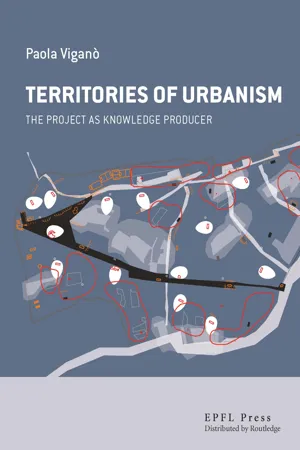
- English
- PDF
- Available on iOS & Android
About this book
This book addresses the ability of the design of the city and the territory to produce knowledge; this hypothesis pertains to the tools and the operations of design by which the research itself is constructed. To this end, the book crosses physical and conceptual territories as the result of direct explorations connected with a design practice that has produced original knowledge. The project contains, manipulates, and produces concepts as concrete forms of action in space that interpret, abstract and, at times, generalize. Its tools make it possible to cut through layers of differences and complexity like a knife. The project describes and reveals processes of individualization, as it recognizes situations and uncovers possibilities. It considers the future and then reflects on the city as the basis for an original form of knowledge and awareness. After the crisis of expert knowledge, and during a period of progressive marginalization and simplification of the practice of the architect and urban designers, a re-consideration of the epistemological status of the project is fundamental to rethinking its social role and developing a critical vision of the world.
Frequently asked questions
- Essential is ideal for learners and professionals who enjoy exploring a wide range of subjects. Access the Essential Library with 800,000+ trusted titles and best-sellers across business, personal growth, and the humanities. Includes unlimited reading time and Standard Read Aloud voice.
- Complete: Perfect for advanced learners and researchers needing full, unrestricted access. Unlock 1.4M+ books across hundreds of subjects, including academic and specialized titles. The Complete Plan also includes advanced features like Premium Read Aloud and Research Assistant.
Please note we cannot support devices running on iOS 13 and Android 7 or earlier. Learn more about using the app.
Information
Table of contents
- Table of Contents
- Dedicated to Alberto Viganò
- Introduction
- Part I: Conceptual Territories
- Part II: Territories of Description
- Part III: Territories of the Future
- Epilogue: The Project As Knowledge Producer
- Bibliography
- Images
- Index nominum